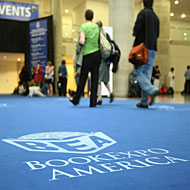
Iceland’s volcanic ash cloud dampened business at last month’s London Book Fair, so now more work is being done at New York’s Book Expo, which officially opened yesterday at New York’s Javits Center. It seemed fitting that the convention would get such an apocalyptic boost, as it reflects the dystopian mood of the attendees and the panels: There’s a Brooklyn panel being held tonight with Gary Shteyngart called “Bleak Future.”
For the Expo’s preopening “Education Day” for booksellers, the publishing-house CEOs gathered Monday morning to debate “The Value of a Book”; not so much its intrinsic value as an object, which the moderator of the panel, Farrar, Straus & Giroux head Jonathan Galassi, defended in a New York Times op-ed this year, but rather what publishers can reasonably charge for it. The assumption going in was that e-books would soon dominate (they certainly dominated the panel discussions), and all that was left to do was to figure out how the hell book publishers could survive the transition intact. Oddly, the most optimistic panelist was Bob Miller, who recently became head of Workman Press after abandoning HarperStudio, the profit-sharing imprint that was supposed to save the industry.
Also on the panel was Authors Guild president Scott Turow, who lamented that quivering publishers had ceded ground to price-cutting Amazon. Galassi conceded that the Amazon concession was “a mistake,” but focused on decisions going forward; after all, the horse was out of the barn, the barbarians well past the gate. Asked how fiction might respond to the Great E-Book Transformation to Come (Google clouds, device-agnostic free-floating manuscripts, etc.), he said: “Authors will respond not to the technology, but to the timbre of the times, the motives and aspirations to which literature has always spoken.”
Some of the fair’s hottest books looked forward, with the same mixture of boldness and trepidation as the publishers who gathered to plug them. Novelist Jennifer Egan (The Invisible Circus) offered a sample chapter of her forthcoming 2020-set effort, A Visit From the Goon Squad, and said chapter was written entirely in PowerPoint. Star book-signer Shteyngart was here to pitch August’s Super Sad True Love Story, a wonderfully cranky picture of New York on the verge of dissolution, also circa 2020. Yesterday, a full panel was devoted to dystopian fiction; among the books mentioned was Sigrid Nunez’s Salvation City, out in September and set in a postapocalyptic Midwestern settlement.
When it came to coping with the current reality of the book industry, the fair actually seemed to have reached a new phase: acceptance. Like paperbacks, conglomerates, Barnes & Noble, and Amazon before it, the coming mind meld of text and electronic media has evolved from a sign of the apocalypse to a plain fact of life. Even longtime ICM agent Esther Newberg, whose biting zingers on Monday’s CEO panel provided comic relief, conceded that what the panelists referred to as “Enhanced E-Books” (texts with multimedia links) might be a boon to mass publishing. But, she added, “One of the only good things about being old is that I won’t have to deal with this.”





